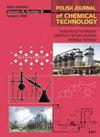重油煤混合物的自催化加氢
IF 0.7
4区 工程技术
Q4 CHEMISTRY, APPLIED
引用次数: 0
摘要
煤液化和重油加工已成为中国迫切需要的国家能源战略技术储备。然而,固体催化剂的失活是这些过程中不可避免的问题。因此,提出了一种自催化方法。改性剂具有自催化作用,无需再添加催化剂,可以改变原料油的性质。考察了200 ppm和500 ppm改性剂对重油加氢和煤、油加氢的影响。结果表明,改性剂在50~100℃时能与稠油混相,并能改变稠油的性质。当温度超过250℃时,重油中的硫元素与改性剂引入的金属元素结合,形成2-8 nm大小的颗粒,与氢分子相互作用,使氢分子活化。活化的氢原子进一步与重油中的镍、钒、钙、铁等元素形成配合物,达到净化和轻化油相的目的。因此,自催化法在炼油中具有广泛的应用前景,将极大地促进炼油和催化工业的发展。本文章由计算机程序翻译,如有差异,请以英文原文为准。
Self-catalysed hydrogenation of heavy oil and coal mixtures
Abstract Coal liquefaction and heavy oil processing have become the urgent need for national energy strategic technology reserves in China. However, the inactivation of solid catalysts in these processes is an inevitable problem. Therefore, a self-catalysed method was proposed. The properties of raw oil could be changed by adding a modifier, as it has the function of self-catalysis, and the additional catalyst is no longer needed. The effect of 200 ppm modifier on the hydrogenation of heavy oil and 500 ppm on the hydrogenation of coal and oil were investigated. The results showed that modifiers could be miscible with heavy oil at 50~100 °C and could change the properties of oil. When the temperature exceeded 250 °C, the sulfur element in the heavy oil combined with the metal element brought in by the modifier to form a particle with the size of 2–8 nm, which could interact with the hydrogen molecule to activate the hydrogen molecule. Activated hydrogen atoms further formed the complexes with nickel, vanadium, calcium, iron, and other elements in heavy oil to achieve the purpose of purifying and lightening the oil phase. Therefore, the self-catalysed method could be widely used in oil refining and would greatly promote the development of the oil refining and catalysis industry.
求助全文
通过发布文献求助,成功后即可免费获取论文全文。
去求助
来源期刊

Polish Journal of Chemical Technology
CHEMISTRY, APPLIED-ENGINEERING, CHEMICAL
CiteScore
1.70
自引率
10.00%
发文量
22
审稿时长
4.5 months
期刊介绍:
Polish Journal of Chemical Technology is a peer-reviewed, international journal devoted to fundamental and applied chemistry, as well as chemical engineering and biotechnology research. It has a very broad scope but favors interdisciplinary research that bring chemical technology together with other disciplines. All authors receive very fast and comprehensive peer-review. Additionally, every published article is promoted to researchers working in the same field.
 求助内容:
求助内容: 应助结果提醒方式:
应助结果提醒方式:


